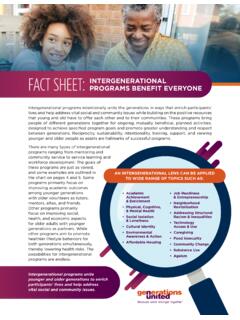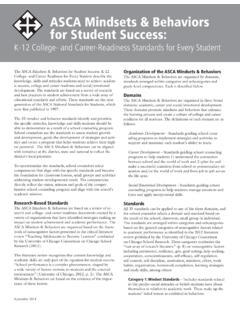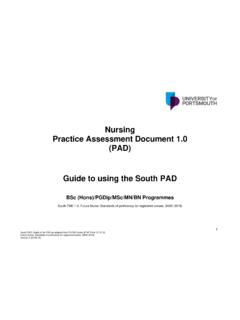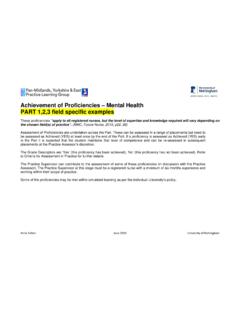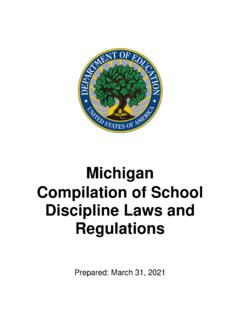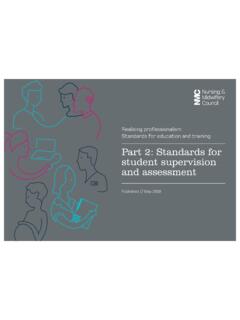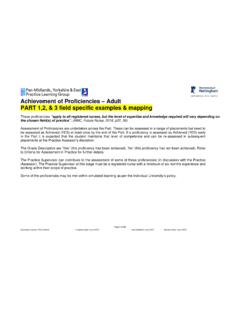Transcription of PLPLG Guide to Completing the Pan London ePAD
1 Nursing Practice Assessment Document (ePAD). Guide to Completing the Pan London ePAD. BSc (Hons)/PG Dip/MSc Programmes PLPAD Future Nurse: Standards of proficiency for registered nurses (NMC 2018). 1. Updated for ePAD - February 2021. Completing the Practice Assessment Document Contents Page number Introduction 3-4. Criteria for Assessment in Practice 5. Criteria for Assessment in Practice Overall framework Parts 1 3 6. Student responsibilities 7. Practice Supervisor responsibilities 8. Practice Assessor responsibilities 9. Academic Assessor responsibilities 10. Introduction and Guidance - what to complete and when 11. Document Signatories and Nominated Person 12. Orientation 13. Initial, Mid-point and Final Interview 14. Professional Values 15. Patient/Service User/Carer Feedback Form 16. Record of Learning from Others 17. Additional Professional Feedback 18.
2 Peer Feedback 19. Proficiencies 20. Episode of Care 21. Medicines Management 22. Progression towards registration record of weekly meetings in final placement 23. Action plan and Action Plan Review 24. Practice Evaluation 25. Record of Practice Hours 26. Ongoing achievement record (OAR) 27. How does the ePAD relate to different fields of practice? 28-31. 2. Updated for ePAD - February 2021. Introduction The purpose of this Guide is to provide guidance for the completion of the Nursing Pan London Practice Assessment Document (PAD) using the online system known as the Pan London ePAD. General guidelines are provided for each element within the PAD. This guidance should be read alongside specific instructions that may apply to individual universities. The PLPAD has been developed to ensure that student nurses are prepared to successfully meet the Future Nurse: Standards of proficiency for registered nurses (NMC 2018) at the point of registration.
3 The NMC standards specify the knowledge and skills that Registered Nurses must demonstrate when caring for people of all ages and across all care settings and comprise seven platforms and two annexes. The role of the Nurse in the 21st century is to provide care for people who have complex mental , physical, cognitive and behavioural care needs across a range of settings including people's own homes, in the community or hospital or any health care setting. The platforms are: 1. Being an accountable professional 2. Promoting health and preventing ill health 3. Assessing needs and planning care 4. Providing and evaluating care 5. Leading and managing nursing care and working in teams 6. Improving safety and quality of care 7. Coordinating care Annexe A: Communication and relationship management skills Annexe B: Nursing procedures The outcome statements within the standards of proficiency apply across all fields of nursing practice (Adult, Child, Learning Disabilities and mental health ) and all care settings as Registered Nurses must be able to meet the person-centred, holistic needs of the people they encounter in their practice who may be at any stage of their life and who may have a range of mental , physical, cognitive or behavioural health challenges.
4 The annexes within the standards of proficiency also apply across all fields and demonstrate what Registered Nurses should be able to demonstrate at the point of Registration. The level of expertise and knowledge required for both annexes will vary dependent on the chosen field(s) of practice. Registered Nurses must be able to demonstrate the ability to undertake these skills and procedures at an appropriate level for their intended field(s) of practice. 3. Updated for ePAD - February 2021. Practice Supervisors, Practice Assessors and Academic Assessors have an important role in supporting and guiding the student through their learning experience. This includes facilitating any reasonable adjustments the student may require to achieve the maximum benefit from the placement. Descriptions of these roles can be found within this Guide .
5 As well as undertaking the required assessments, the role of the Practice Supervisor and Practice Assessor also includes identifying relevant learning opportunities and creating learning and development plans with the student. The document has been designed around the following Components of Assessment and Feedback: Initial, Mid-Point and Final Interviews per placement Professional Values Proficiencies Episode(s) of Care Medicines Management Patient/Service User/Carer Feedback Form Record of learning from others/interprofessional working Additional professional feedback Peer feedback Ongoing Achievement Record 4. Updated for ePAD - February 2021. Criteria for Assessment in Practice Within the PAD three key statements have been developed to reflect the level of performance that the student is required to demonstrate at the end of each Part, as well as the level of assistance that may be required at each stage where the student by the end of the Part is practising independently, competently and confidently.
6 The following three levels of performance are to be met by the end of each Part: refer to table 1. By the end of Part 1 Guided participation in care and performing with increasing confidence and competence Active participation in care with minimal guidance and performing with increased confidence By the end of Part 2. and competence Practising independently with minimal supervision and leading and co-ordinating care with By the end of Part 3. confidence Table 1. In addition to achieving the required level of performance at the end of the Part the student is assessed against a specified set of criteria related to knowledge, skills, attitudes and values for each component of assessment within the PAD. These criteria are used to assess the student on different placements across the year as they work towards the overall performance level to be achieved by the end of the Part.
7 For details of the criteria in each Part refer to Table 2. If the student's performance gives cause for concern at the mid-point interview or at any point during the experience feedback must be given and an action plan written to enable the student to address this prior to the final interview. The Practice Assessor must communicate with and involve the Academic Assessor in this process. Within the PAD there may be guidelines relating to how the assessment is managed within the university, and the student should ensure that they have read and understood these. Statement regarding the use of the term Parts . There are three Practice Assessment Parts in total, which incorporate the range of Future Nurse Standards of proficiency (NMC 2018). Parts in this context is used to represent the range of outcomes to be achieved by students at different levels.
8 These parts may differ from the stages of the education programme that will be defined locally by each university provider. 5. Updated for ePAD - February 2021. Parts 1 3. Table 2. 6. Updated for ePAD - February 2021. Student Responsibilities You should take responsibility for your own learning and know how to access support and: Engage positively with all learning opportunities Understand the assessment requirements Work with and receive written feedback from a range of staff (including identified Practice Supervisors) and Service-Users Reflect on your own learning Provide feedback on learning experience Q: When should I contact my allocated placement? A: It is advisable to contact your allocated placement in advance of starting your placement to obtain the information you need to enable you to prepare. Q: Will I have a named contact on placement?
9 A: You will have a Nominated Person to support you and address any concerns. This could be a Placement Manager, Ward Manager, Team Leader, Service Manager or other. Q: Who will supervise me on placement? A: You will be supported by a number of Practice Supervisors who will support your learning and can contribute to assessment (refer to Practice Supervisor Responsibilities). Q: Who will assess me on placement? A: You will have a nominated Practice Assessor for your placement, who is responsible for assessing and confirming proficiency and achievement. The Practice Assessor will liaise with the Practice Supervisor and Academic Assessor to obtain feedback on your progress (refer to Practice Assessor Responsibilities). Q: Will there be support from the university when on placement? A: You will have a named Academic Assessor for each Part of the programme.
10 The Academic Assessor will liaise with your Practice Assessor. If you have any concerns regarding your practice learning you should raise these with the university as soon as possible (refer to Academic Assessor Responsibilities and university guidelines). Q: What if I can't access my ePAD when on placement? A: It should be possible to access your ePAD website from any PC, laptop or mobile device with network / wifi / data connection. Some practice provider organisations have strict internet access rules which may need to be adjusted to allow access for the ePAD website when using their PCs. If you have any technical difficulties with the ePAD raise them immediately with your university's ePAD support via the email address you have been given. 7. Updated for ePAD - February 2021. Practice Supervisor Responsibilities Practice Supervisors (PS) are Registered Nurses or Midwives or Registered health or social care professionals.




